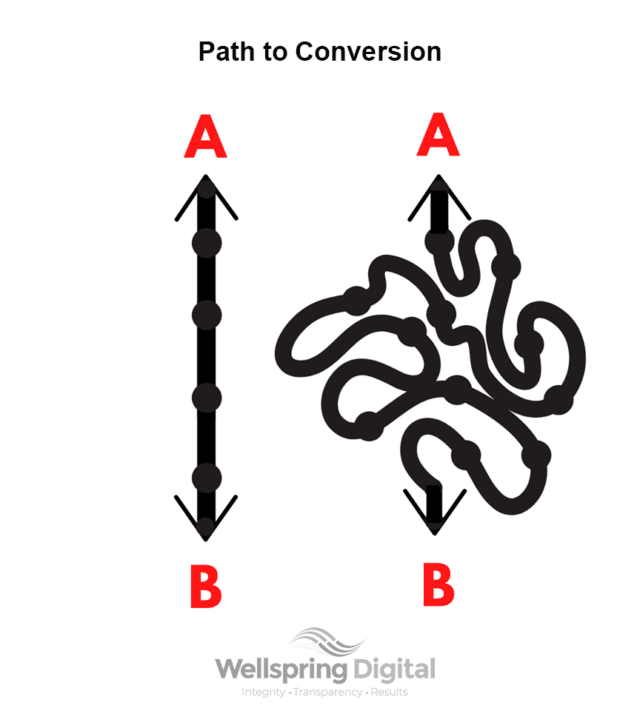Marketing automation has revolutionized marketing and sales processes for all types of businesses. Even non-profits, associations, and educational institutions can benefit from an expertly executed marketing automation effort. The robots are taking over!

But, is it still OK to nurture leads in a pandemic using marketing automation? Can the robots have a heart?
My daughter sure thinks so. I asked her to draw me a robot. The heart was all her idea, and she’s on to something. We all need more heart right now.
The world is suffering. Many countries, states, towns, hamlets, villages are simply shut down. At best, people are stuck at home going stir crazy. At worst, people are hungry, sick, alone, afraid, or having to put themselves in harm’s way.
We will get through this, but that doesn’t make it any less scary.
So, while all this is going on, how can we focus on running and even building our businesses? How can we market to an audience we know is suffering? Empathy.
Here’s the good news. The empathy you practice now will still be useful when roses are again red and violets are back to blue.
Understanding Your Client’s Needs
The more you read my posts here the more you may say I’m a bit of a broken record, and I’m fine with that. It’s a message you need to hear more than once…
You have to know your audience, not just their demographics, but their story. You have to know their motivations, thoughts, dreams, fears, needs, and wants. If you don’t, it will show through in your marketing efforts.
And in a time of crisis, you will appear more tone-deaf than ever. If you come at them with messaging and offers that aren’t coming from a place of empathy, you will appear as if the crisis doesn’t matter to you and you don’t think it matters to them either.
If you’ve developed some buyer personas, then you’ve already started down the path of empathy. But, those personas will likely be missing any insight into how your audience is feeling right now.
So, how do you understand your client’s needs in times like these? You ask. Give them a call. Drop them an email. Approach them from a caring place to find out how they’re doing. Ask them about their fears right now. Ask them about their worries. And ask them what you can do to help.
The information you get here will serve as a valuable filter to run all of your marketing efforts through.
Back to Lead Nurturing
Lead nurturing is the practice of using strategically timed ads, offers, and emails to encourage someone along a path to conversion, the point where they take an action you want them to take.
The typical linear sales funnel is no longer applicable. Today, the path a client takes to conversion looks more like the path a Jack Russell Terrier takes to find that ball you threw into the bushes. They’re all over the place.

In the drawing above you see two paths from A to B. The path on the left is the straight-line associated with the old style of the marketing funnel. The path on the right is a more realistic representation of the path a user takes to get to the point of conversion.
So, with lead nurturing you can set up triggers (the dots in the drawing above) based on the actions they’re taking. These are automated touchpoints designed to elicit an action or to move them further along the path.
For example, if they read a blog post but navigate away from the website, maybe you hit them with some retargeting ads on Facebook promoting an offer for products or services, or even another blog post on a related topic. This can be a gentle reminder that you’re still there and they might be missing out.
It can also be presented to them in a targeted emailer. For example, they downloaded an eBook or whitepaper in exchange for giving you their contact information. You use marketing automation to email a check-in with them and urge them to take the next action, such as signing up for a webinar.
There are many ways you can use marketing automation to keep your audience engaged and move them along the path to conversion.
Messaging in a Pandemic
But, these efforts can also do damage to your brand if you appear tone-deaf or motivated by greed alone. This is why you need to do these things from a place of empathy.
I’m not saying marketing and sales are bad things during a crisis. What I’m saying is to think through the messaging you’re putting in front of your audience and the actions you’re urging them to take.
You don’t have to make everything about COVID-19, we’ve all experienced some overload in this category.
You can still push out marketing messages that are solely about your products or services, just to think through how it will land. Will the message somehow anger them or at least annoy? Or will they be receptive to it because it’s something they want to see?
Also, is what you’re selling a need or a want?
If it’s a need, you can afford to be a bit more aggressive. If it’s a want, you’ll need to tread lightly. People are on edge, looking for any excuse to blow up on Facebook, Twitter, or wherever they like to complain. Make sure you’re thinking about when, how, and why they will want this thing and then craft your messaging accordingly.
If you’re actively managing your marketing automation, meaning testing, tracking, and adjusting based on performance and feedback, then pivoting in a crisis like this shouldn’t be a major undertaking.
You will find a pivot more difficult if you’re doing the same things you mapped out 6 months ago and aren’t actively testing, tracking, and adjusting.
Context Is Everything in Lead Nurturing
If you watched, read, or listened to our interview with Mathew Sweezey, author of The Context Marketing Revolution, then you understand the importance that context plays in any digital marketing effort.
A solid understanding of the context of a user’s experience in dealing with you will often be the key to success. As you urge them along the path to conversion, think about these three things for each touchpoint they encounter from you:
- Physical state and location – are they on the go? Are they stuck at home? Or maybe they’re one of the brave few on the front line.
- Mindset – how are they feeling during this moment? Are they worried? Stressed? Or excited?
- Motivation – if you don’t know their problem or need (as it’s not always a negative), you can’t offer an effective solution. Why should they act on that piece of marketing you put in front of them?
Mapping these to your touchpoints will quickly illuminate how well your messaging and offers will be received. If you expect someone to take a complex action when they are on the go, your conversion rates will suffer.
If you want them to purchase something expensive when they were just furloughed, you might see some backlash. And, most importantly right now, try to make sure each touchpoint and action they take is something that will help them in some way. It doesn’t have to be a huge help, just something to make their day better, easier, safer, or more tolerable.
Practice Empathy in Your Marketing
As long as you understand the context of each moment during a lead nurturing campaign, and develop touchpoints that empathize with the current situation of the person you’re targeting, your marketing efforts will be more effective and even appreciated.
This practice is not just for tough times. Empathy in marketing is something that never goes out of style. And because of the seemingly random paths someone might follow along the way to conversion, understanding the context of each moment will continue to improve results even in good times.
How are you practicing empathy right now with your marketing? Let me know in the comments section below.
If you need help with marketing automation or lead nurturing, drop us a line or call us at 301.304.9349. Thanks and stay safe out there!